How Women Shaped Akron – Our First SHEroes
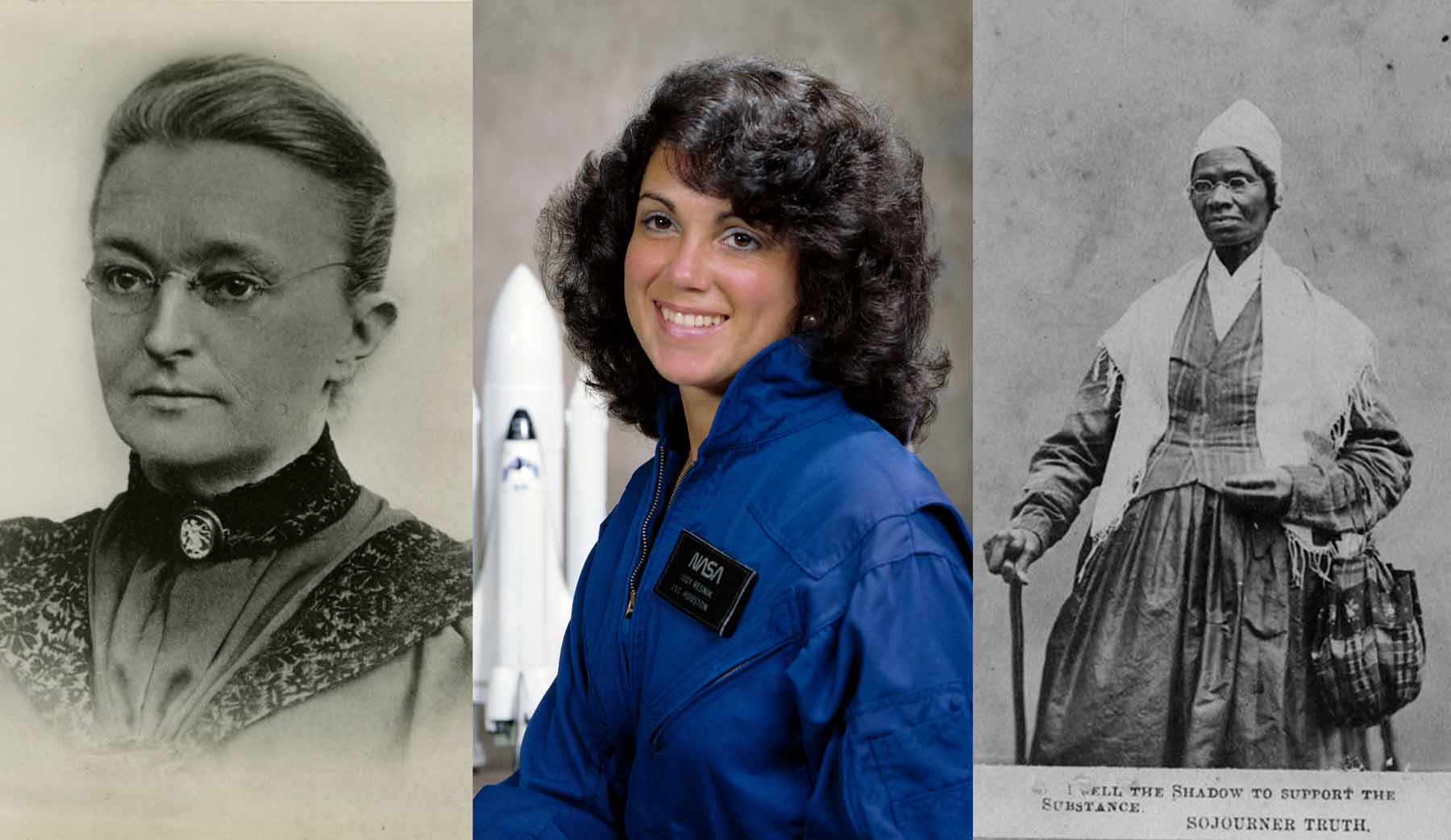
“To know your future you must know your past.”
– George Santayana
This introduction sets the stage for all that comes after. It features notable Akron women in history – pioneers and leaders who shaped and inspired our community from its earliest days and beyond. The Women's Endowment Fund believes that in order to know where we are headed, it is important to know who came before us.
A resource of the Summit County Historical Society, the Akron Women's History site tells the stories of some of the Akron and Summit County women whose stories have been lost. The women profiled on this site made important contributions to the city and the county through the jobs they held, the businesses they ran, the reforms they led, or the volunteer work they did. Highlighted below are just a few of these notable women from our city:
Sojourner Truth (1797-1883)
Born into slavery as Isabella Baumfree, Sojourner Truth was a famous orator and abolitionist. Although not from Akron, Sojourner Truth delivered her "Ain't I a Woman?" speech during the Ohio Women's Rights Convention on May 29, 1851, at the Universalist Old Stone Church right here in Akron. Please take a few moments to read about community efforts to honor her legacy of advocacy and leadership at the Sojourner Truth Legacy Plaza.
The plaza is a collaborative project by the Summit Suffrage Centennial Committee, City of Akron, United Way of Summit & Medina, Summit Metro Parks, African American Cultural Heritage Action Fund, John S. and James L. Knight Foundation, and other community stakeholders. The statue, which will be the first memorial statue of a Black woman in Akron, was designed by Akron native Woodrow Nash. The public park was developed by landscape architect Dion Harris of Summit Metro Parks. Gifts to support this historic statue can be made to the Sojourner Truth Project – Akron Fund at Akron Community Foundation.
Mary Ingersol Tod Evans (1802-1869)
Mary Ingersol Tod Evans believed the Akron Rural Cemetery, now Glendale Cemetery, deserved to be as beautifully kept as the rest of the city. For that reason, she established the Ladies Cemetery Association and raised funds to build a residence for a groundskeeper.
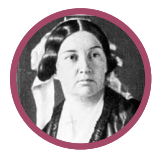
Grace Tod Perkins (1811-1867)
Grace Tod Perkins joined her sister Mary Evans to establish the Ladies Cemetery Association. She married Colonel Simon Perkins in 1832, and the couple became influential philanthropists and community leaders in Akron. Perkins continued to support the Ladies Cemetery Association in its mission to beautify the Akron Rural Cemetery, now Glendale Cemetery, until her death in 1867.
Katharine Benedicta Trotter Claypole (1846-1901)
Katharine Claypole married scientist and scholar Edward Waller Claypole in 1879. She was the first president of the Akron Women's Council and an active voice in the women's suffrage movement. In 1894, she served as the recording secretary of the Ohio State Suffrage Association and lobbied state legislators to allow women to vote for and serve as members of Ohio school boards. She was also a member of the National American Woman Suffrage Association. Both of her and Edward's daughters became scientists.
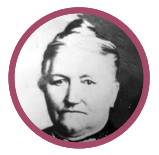
Margaretha Gerhardt Burkhardt (1848-1925)
Margaretha Gerhardt Burkhardt was not even 35 yet when she took over Burkhardt's Brewery, now known as Thirsty Dog. She not only ran the business for over 40 years, but she also increased productivity and profits for the brewery. Around the turn of the 20th century, Burkhardt led the charge to diversify the business, allowing the brewery to succeed through the prohibition era.
Gertrude Ferguson Penfield Seiberling (1866-1946)
Gertrude Ferguson Penfield Seiberling was an influential patron of the arts. She became a charter member of the Tuesday Afternoon Club, now Tuesday Musical Association, and later the organization's honorary president. Seiberling was also the founder and first president of the Akron Garden Club.
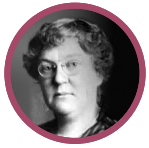
Mary Perkins Raymond (1871-1948)
The granddaughter of Grace Tod Perkins, Mary Perkins Raymond was born into a family of philanthropists. She worked with her family to establish the first day care in Akron, the Mary Day Nursery, named after her daughter. Akron women donated their time and funds to support the day care. Eventually, the nursery expanded and became Akron Children's Hospital.
Henrietta Buckler Seiberling (1888-1979)
Henrietta Seiberling co-founded Alcoholics Anonymous with Dr. Bob Smith and Bill Wilson. She played a fundamental role in developing the group's core practices and connection to Christianity.
Sister Mary Ignatia (1889-1966)
Sister Mary Ignatia was another influential woman in the founding of Alcoholics Anonymous. While she was working as an administrator at St. Thomas Hospital in 1934, Dr. Bob Smith and Bill Wilson approached her about using space in the hospital for their newly developed therapy for alcoholics. She provided counseling and other services to those in recovery. In 1952, she opened Rosary Hall, a ward dedicated to the treatment of alcoholics, at St. Vincent Charity Hospital.
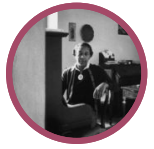
Julia Perry (1924-1979)
Julia Perry was a talented musician, teacher and composer. She attended both Akron Public Schools and the University of Akron. Perry found success as a composer, performer, lecturer and conductor in Europe. Upon her return to the United States, Perry's work was mostly overlooked. While several of her early works were published, many remained unperformed. After a series of strokes in 1970, Perry continued to compose solely by writing with her left hand. She died in 1979. The Akron Symphony's Julia Perry Project is committed to shining a light on Perry's legacy.
Judith Resnik (1949-1986)
Akron native Judith Resnik was an engineer, as well as the second American woman and first Jewish woman in space. Resnik was on her second mission to space on the Challenger shuttle on Jan. 28, 1986, when the shuttle exploded only a minute after takeoff. After her death, Resnik was awarded the Congressional Space Medal of Honor. The Judith A. Resnik Community Learning Center was named for her, as well as a dormitory at Carnegie Mellon University; an elementary school in Gaithersburg, Maryland; and a middle school in San Antonio, Texas. Both a crater on the moon and one on Venus have been named in memory of Resnik and her passion for scientific discovery. Akron Community Foundation also has two scholarship funds established in Resnik's memory that award scholarships to seniors at Akron Public Schools who plan to pursue a career in science, technology, engineering, mathematics or a related field.
Rita Dove (b. 1952)
Rita Dove was born in Akron in 1952. She became a Presidential Scholar in 1970 and won the Pulitzer Prize for her third collection of poetry in 1987. She served as U.S. Poet Laureate at the Library of Congress from 1993 to 1995. She received the National Humanities Medal from President Bill Clinton in 1996 and the National Medal of Arts from President Barack Obama in 2011. Dove received the 2021 Gold Medal for Poetry from the American Academy of Arts and Letters, becoming only the third female and first African American poet to receive this honor in the medal's 110-year history. Most recently, Dove was a recipient of the 2022 Ruth Lilly Poetry Prize. Her latest collection of poems, "Playlist for the Apocalypse," was named a Top Book of 2021 by the New York Times.
"We Need a Foundation"
(1978-1993)
1978: Women's Network Created – Relationships Born Here
Founders and early supporters of the Women's Endowment Fund first met through the Women's Network. The Women's Network brought women leaders together to foster new relationships, create deep connections and catalyze change. The Women's Network Leadership Institute remains a powerful connector among women in our community to this day.
Summer 1986: Too Many Needs to Count
One Sunday morning in the summer of 1986, Marie Covington and Norma Rist were sitting on Marie's back porch, chatting about life and their community. Norma was president and Marie was vice president of the Women's Network, so the conversation naturally turned toward the needs of women and girls in Summit County. The two women brainstormed a long list of women's needs and "what we would do if we had the money." The list was long – spanning 52 lines on a typed sheet – and just touched the tip of the iceberg. There were, in fact, too many needs to count and very little funding to support any of them. "How are we going to do all this?" the two women wondered. And with the next four words that Marie uttered – "We need a foundation" – the idea for the Women's Endowment Fund was born.
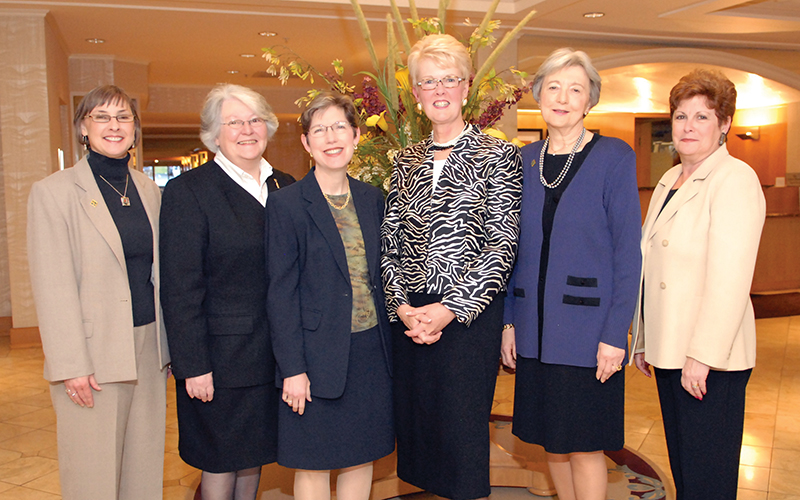
Jan. 30, 1987: Floating the Idea
Marie and Norma convened a group of women leaders (groundbreakers at the time) at Cascade Club* to explore how to make this happen and support women and girls in our community. All these women were connected through the Women's Network.
From here, and from the many lunches and meetings that followed, a like-minded group of women emerged who ultimately became the fund's founding mothers: Marie Covington, Norma Rist, Carrie Herman, Ilene Shapiro, Laurie Zuckerman and Jody Bacon.
*Although the Akron City Club was the "place to be" for city leaders, women were not able to join at that time.
1990: Jody Bacon Comes to Town – Anchoring at Akron Community Foundation
Akron Community Foundation hired Jody Bacon as its first executive director and president in 1990. The founding mothers recall that was particularly noteworthy because women weren't often hired into positions such as these at that time.
It was Jody Bacon who introduced the idea to the five other founders that the Women's Endowment Fund should not be its own separate foundation, but should be a part of Akron Community Foundation.
With Jody's guidance, the six founders developed a clear blueprint for an affiliate fund at the community foundation. This structure provided a vehicle to get off the ground more quickly, offered instant credibility as an already-established funder, and allowed the founders to focus on grantmaking rather than administration.
1991-1993: Chicken Salad Sandwiches and a Good Pair of Shoes
The founding mothers set a goal to raise $100,000 of all women-donated money. They set out to host many, many fundraising lunches. The founders believed that "every woman can be a philanthropist." Their plan was for 100 women to donate $1,000 each, and their message focused on the power of every woman to be a philanthropist.
Norma Rist recalls this sentiment: "You don't need to be rich. If you break it down into monthly installments, it costs about the same as a good pair of shoes."
Among many, many others, some of these early pioneers for local women who helped build momentum during this time period included Kathryn Hunter, Judy Nicely, Mary Beth Cox, Annie Russell, Ann Brennan, and so many more.
The Birth of the Women's Endowment Fund
(1993-1994)
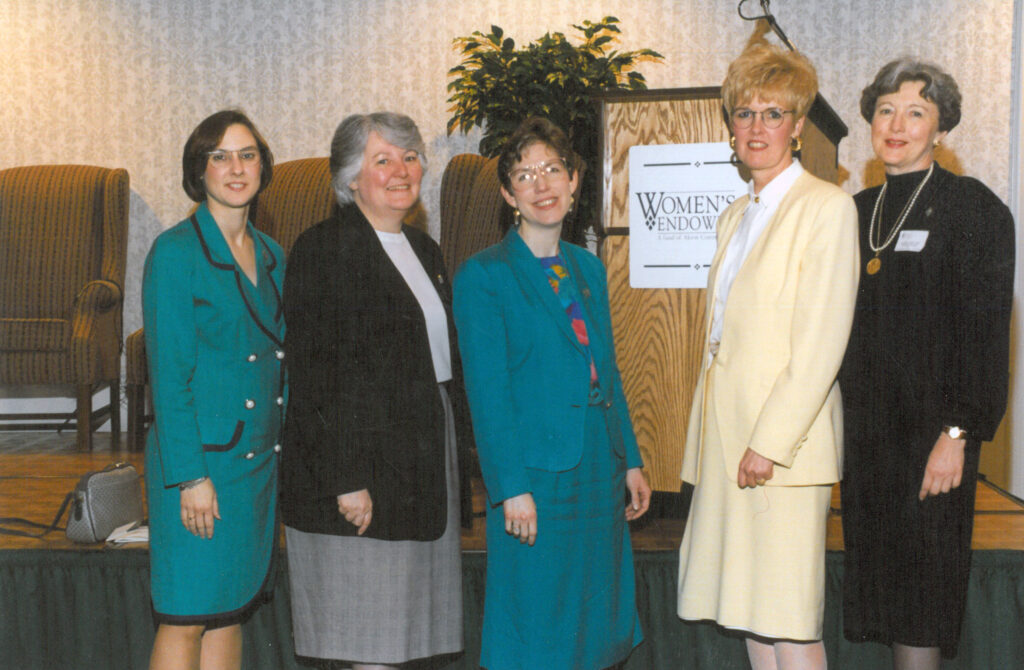
1993-1994: First Gifts Totaling $106,000
The Women's Endowment Fund was established with support from 100 women and one committed father (100 women donated a total of $100,000, and Charlie Booth gave $6,000 in honor of his wife and five daughters).
Only 4% of philanthropic dollars were dedicated to women and girls at this time. By forming this fund, women not only had a voice at the table, they were the table. The Women's Endowment Fund is unique because it is exclusively women who make the funding decisions.
The Women's Endowment Fund was the first women's grantmaking endowment in Northeast Ohio. It became a model and inspiration for other funds, including the Bath Community Fund, Medina County Women's Endowment Fund, Jewish Women's Endowment Fund, and Women's Fund of the Richland County Foundation.
The Women's Endowment Fund's First Decade
(1993-2003)
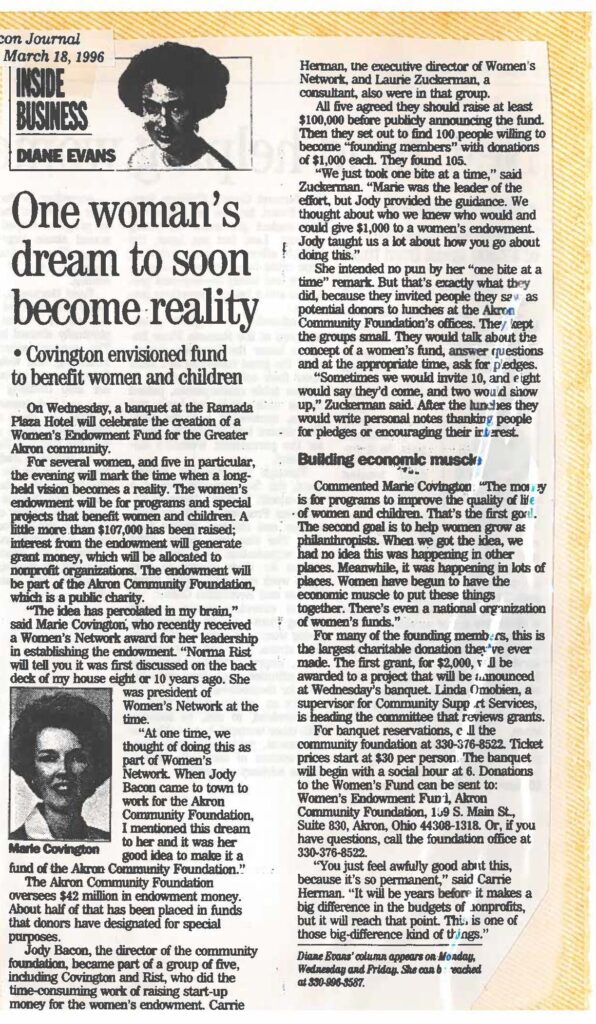
The Women's Endowment Fund's first decade was marked by laying the foundation for informed grantmaking and building a corporate donor base. Here are a few highlights:
1994: Our First Community Forum
Leaders from the Women's Endowment Fund met with four community organizations in an effort to understand the most pressing needs for women at the time. This tradition of convening on-the-ground community organizations to inform grantmaking has continued over the decades through the tradition of holding regular forums dedicated to learning from the community to understand women's needs.
1995: First Grant of $2,500 to YWCA of Summit County
The Women's Endowment Fund's first grant in 1995 funded a new collaboration among five local organizations that offer women's crisis intervention and emotional support services. These five organizations – ACCESS, Battered Women's Shelter, H.M. Life Opportunity Services, Mentoring Moms, and the YWCA – collaborated to form a three-month personal enrichment program to help women in crisis relieve stress, improve their mental and physical well-being, and build self-esteem.
1998: $250,000 Challenge Grant Builds a Corporate Donor Base
Marie Covington and Ilene Shapiro led efforts to expand the Women's Endowment Fund's donor base beyond individual women's giving. To build a corporate donor base, they created a $250,000 matching challenge grant, which truly galvanized fundraising efforts. The founders fondly remember this milestone: "When we hit $250,000, we had a big party at Ruth Dean's house!"
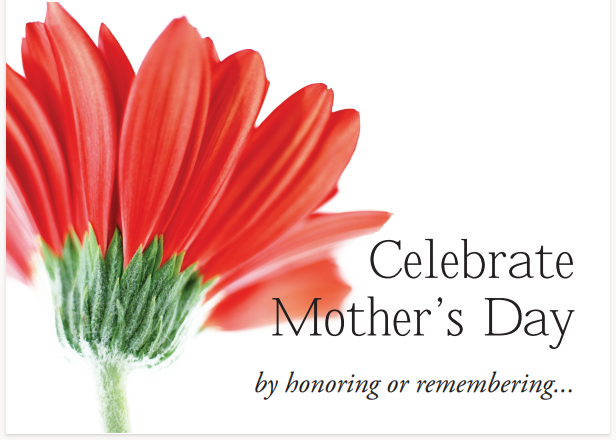
2003: Mother's Day Campaign Created
The Women's Endowment Fund designed its individual annual giving campaign around a Mother's Day theme. Donors were encouraged to donate to the Women's Endowment Fund in honor of their mother and other special women in their life, with Mother's Day cards sent to the honorees in acknowledgment. The Mother's Day Campaign was the predecessor of today's SHEro Campaign.
The Women's Endowment Fund's Second Decade
(2003-2013)
"Seeding Our Future" aptly characterizes the theme of the second decade in the Women's Endowment Fund's history. During this period, the Women's Endowment Fund launched the largest endowment-building campaign for an affiliate fund in Akron Community Foundation's history. The fund also established its three grantmaking priorities, which continue to guide funding decisions to this day.
Among the central architects of the key milestones achieved during this chapter in the fund's history are Janet Kendall White, who served as president from 2005 to 2009, and Tracy L. Carter, who served as president from 2009 to 2013. Under Janet's leadership in 2008, the Women's Endowment Fund created the "For Women, Forever" tagline that is still used today for its annual celebration. Janet also co-facilitated the first seven forums on women and girls hosted by the Women's Endowment Fund.
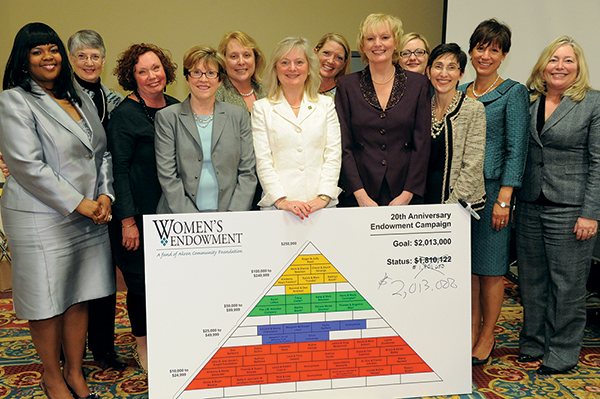
2013: 'For Women, Forever' Campaign Goal Reached
The "For Women, Forever" Campaign represented the fund's goal to raise $2 million in charitable assets. To celebrate the fund's 20th anniversary, the Women's Endowment Fund launched an endowment campaign to raise $2.013 million by 2013.
Led by advisory board members Karen Lefton and Dianne Newman, the historic campaign kicked off at the fund's annual dinner in March 2012 under the tagline "For Women, Forever."
"For Women, Forever" was the largest endowment-building campaign for an affiliate fund in Akron Community Foundation's history. Thanks to the leadership of then-President Tracy Carter and many others, the fund not only reached its goal but exceeded it, raising a total of $2,109,278. This exciting milestone was announced at the annual dinner in March 2013.
Identifying Our Grantmaking Priorities
Under Tracy Carter's and Janet White's leadership, the Women's Endowment Fund established three priority areas to guide its future grantmaking: Economic Empowerment, Health & Wellness, and Safety From Violence.
The Women's Endowment Fund's Third Decade
(2013-2023)
"Expanding Our Impact" is the theme of the third decade in the Women's Endowment Fund's history.
2016: Judith A. Read Tribute Award Established
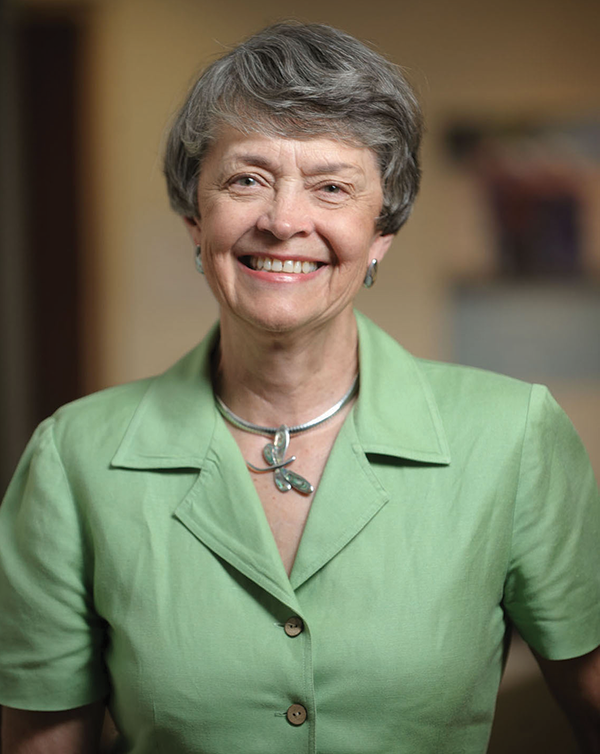
The Women's Endowment Fund created the Judith A. Read Tribute Award for Service & Advocacy for Women in 2016 to honor Judy Read's lifetime commitment to empowering women and girls. Judy lived her life as a tireless advocate, passionate volunteer and insightful leader whose work improved the lives of countless individuals in Greater Akron. She was a longtime supporter of the Women's Endowment Fund and served on its advisory board from 2013 to 2015. Judy and her husband, Roger, also supported the fund by helping to ignite early fundraising efforts and leading the "For Women, Forever" Campaign. Roger Read and his family have carried on Judy's legacy through continued engagement and financial support of the Women's Endowment Fund.
The award is presented annually to an individual or couple who best exemplifies Judy's service, advocacy, leadership and passion in the community. The Women's Endowment Fund has proudly presented the award to eight exemplary women since its inception in 2016:
- 2016: Judy Read
- 2017: Marie Covington
- 2018: Laurie Zuckerman
- 2019: Norma Rist
- 2020: Sylvia D. Trundle
- 2021: Jacqueline A. Silas-Butler, Esq.
- 2022: Dr. Sandy Auburn
- 2023: Tracy L. Carter

2016: SHEro Campaign Created
In 2016, the annual Mother's Day Campaign was replaced with the "Who Is Your SHEro?" Campaign. Community members were still encouraged to make tribute or memorial gifts in honor of the important people in their lives, but this rebranding allowed for more SHEroes to be honored. The possibilities for SHEroes are endless – parents, partners, siblings, friends, mentors or anyone who has positively influenced your life can be recognized as a SHEro.
2017: SHEro Campaign Expands
In 2017, the "Who Is Your SHEro?" Campaign Committee began recruiting a team of dedicated SHEro ambassadors, each of whom committed to raise at least $1,000 through their personal and professional networks. Ambassadors could track their progress toward their goal in real time using a new online fundraising platform.
2018: Circle of Empowerment Formed

In 2018, the Women's Endowment Fund created the Circle of Empowerment to maintain the continued sustainability of the fund and increase its grantmaking impact each year. The Circle of Empowerment is a group of donors who support the Women's Endowment Fund with an annual leadership gift of $1,000 or more.
Donors to the Circle of Empowerment receive special recognition at the fund's events, advance communications about the fund's latest news, opportunities to get involved with the fund's various committees, and more. In 2023, the Circle of Empowerment surpassed 100 members, all of whom provide a sustainable source of support for the fund's future.
2018: $1 Million Grantmaking Milestone
In 2018, during its 25th anniversary year, the Women's Endowment Fund celebrated $1 million in cumulative grants to programs that uplift and empower women and girls.
Spring 2020: Adapting to Changing Times
In March 2020, the world changed. On the very day the Women's Endowment Fund was scheduled to welcome 600 guests to its annual event, the governor of Ohio issued an order shutting down all public gatherings to protect public health in the face of the emerging COVID-19 pandemic.
In May 2020, the Women's Endowment Fund led the way to a "new normal" in events, pivoting to create the very first virtual community event in Akron. Meals were delivered to homes for guests to enjoy while they viewed the program in full from the safety and comfort of their own homes. There was even a virtual cocktail hour featuring photos and pre-recorded video toasts from many of the fund's supporters.
2020: Annual Grantmaking Tops $200,000
In 2020, the Women's Endowment Fund awarded grants totaling $200,004 to 31 nonprofit organizations. This represented the largest amount awarded in a single year since the fund was established in 1993.
2022: A Refreshed Look for the Women's Endowment Fund
In 2022, leaders of the Women's Endowment Fund wanted the fund's logos and color schemes to reflect what it had become – an established source of funding and support for nonprofits in Summit County. While the fund's colors and imagery changed, its mission remained the same.
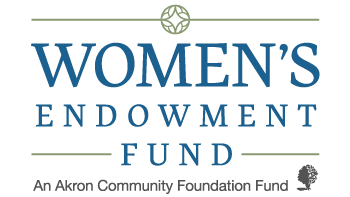
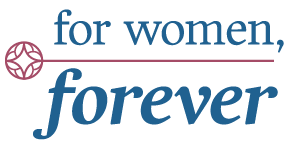
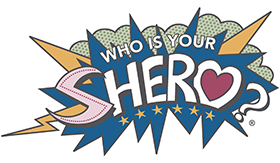
Fall 2022: Our First Grantee Roundtable
In September 2022, the Women's Endowment Fund convened 26 of the 34 nonprofits that received grants that year for its first grantee roundtable. Nonprofit leaders were invited to meet one another and deliver presentations about their organizations, as well as discuss how funding from the Women's Endowment Fund has helped them fulfill their missions. The roundtable was ultimately an opportunity for nonprofit leaders to discuss ways to collaborate with one another as they serve women and girls in our community.
Where Are We Now?
- The Women's Endowment Fund has grown from an initial balance of $106,000 to more than $5.2 million.
- The fund recently celebrated a milestone of $2 million in grants over the lifetime of the fund, directly supporting more than 100 organizations serving women and girls in our community.
- In 2025, the fund awarded 30 grants totaling $191,000 to local nonprofit organizations.
- The Circle of Empowerment has surpassed 100 members, all of whom provide a sustainable source of support for the fund's future.
- In 2025, the fund will host its biennial Forum on Women & Girls with a theme of "Domestic Violence Awareness."
